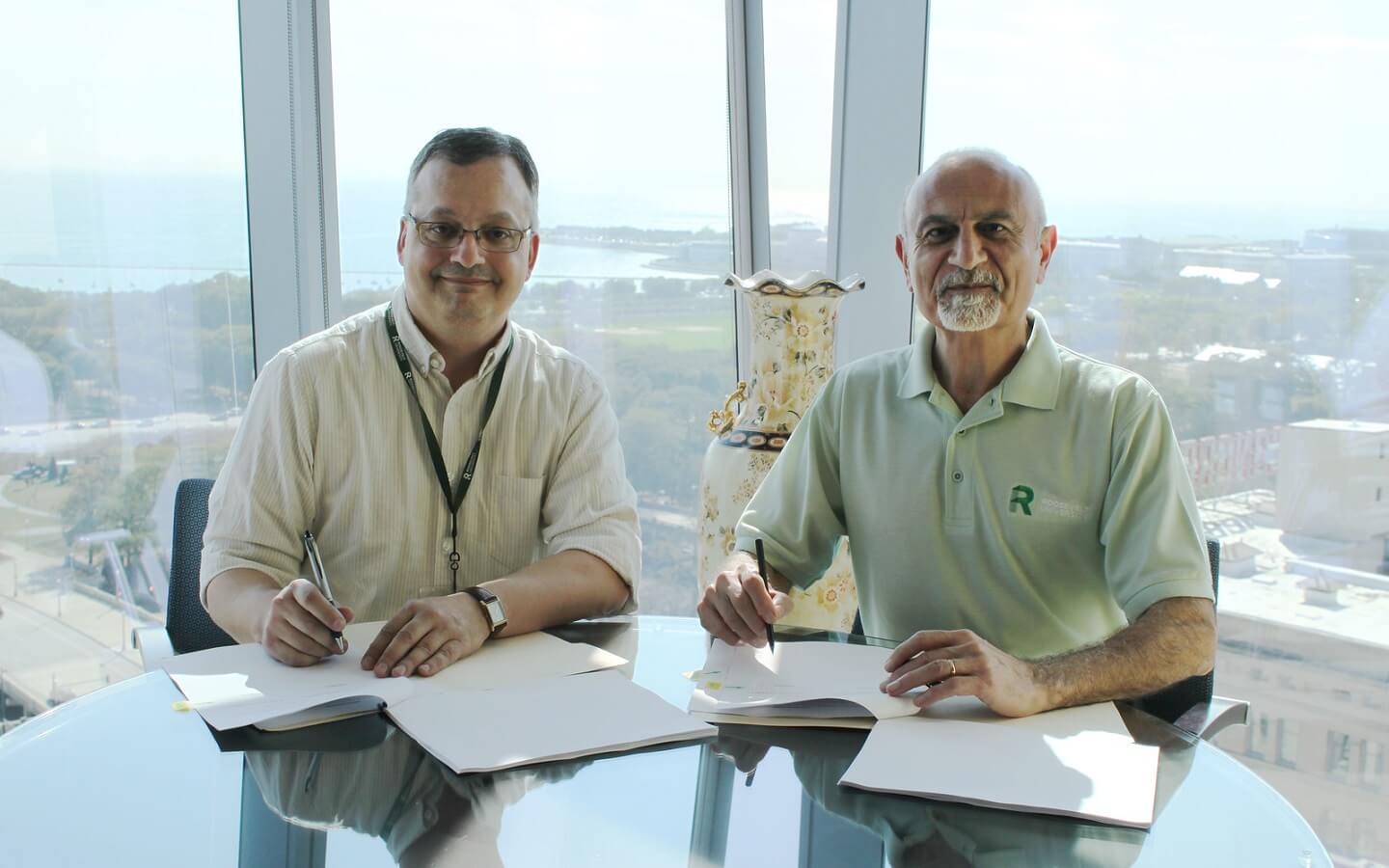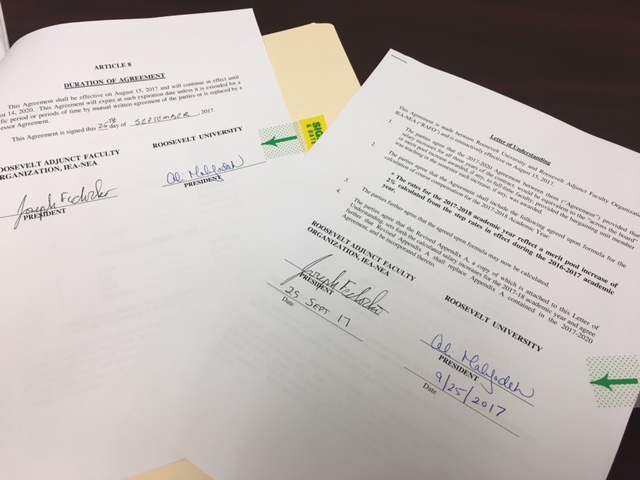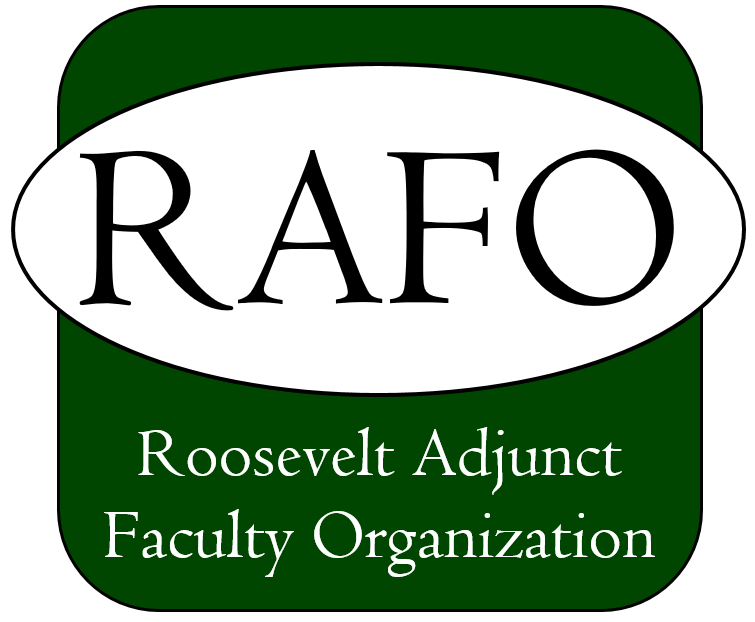Howard Bunsis, Professor of Accounting, Eastern Michigan University.
Like his presentation in 2012 sponsored by AAUP, Bunsis took financial reports and 990s to form a roadmap and ratio analysis of where Roosevelt University is today. Opening comments conveyed three main criticisms with Roosevelt: the overall financial state is worse now than in 2012, the main reason for the financial state remains a decline in enrollment, and Roosevelt lacks transparency in their communications with the staff and faculty. Bunsis did not place much emphasis on the operating budget, as the budget has little to do with the financial outlook. The following are major points of his analysis:
- Looking at the operating budget of $118 million, the main areas of incoming funds were–73% from tuition, 8% from auxiliary funds (housing, dining, and bookstore), 9% from gifts, grants, and contracts, and 7% from investments.
- Roosevelt University’s bond rating has been lowered. Moody’s lowered the bond rating from Ba1 to Ba2. There are a few reasons for this downgrade, including declining enrollment, debt service, and low reserves. RU has been running a deficit for the last four years. A large measure of the problem seems to be the debt. However, they listed other reasons for the downgrade, including low 2016 enrollment number, management blaming the MAP grant funding on this issue, and the transition of several senior leadership positions within the upper administration.
- At this point, Roosevelt University has interest payments that are much greater than the payments toward the principle. For example, for the years 2008, 2009, and 2010, all payments were solely on interest; jumping ahead, in 2016, RU paid $14 million on interest and a little over $2 million on principle. While Bunsis acknowledges that debt service is a problem, he asserted that it did not justify the cuts to faculty.
- In 2016, RU has a liquidity level of $130 million. However, the endowment only equals $82.9 million, increasing to this level from $80.2 million in 2011. This level of endowment supports between $3 – 4 million in student support and scholarships. The causes of the low endowment growth remains levels of giving have not increased, the consecutive investments, and overall low contributions.
- From the 2016 audited financial statements, the summary includes three main areas within the university. The university brought in $116 million with expenses of $119 million. The RUDC (Roosevelt University Development Company) ran a deficit of $400,000 while the Auditorium Theater had a revenue line of $1.2 million but costs $2.3 million to run the theater each year. RU has a 4.9% deficit right now.
- Total enrollment from 2016 equals 4,700 students in comparison to 2009 with 7,642 students. Undergraduate part-time students have decreased by over 67% from 2008–1,752 students to 2016 with 495 students enrolled.
- Tuition discounts contribute to the financial picture of RU as well. In 2008, students were granted a 13.7% discount on tuition in the form of scholarships while in 2016 on average students received 25.7%.
- Instructional expenses amount to 49.2% of the total cost of running the university, with 20.9% of the expenses covering the upper administration. Roosevelt University spends $3.8 million less on salaries than its peers. The peer group includes the following institutions: Aurora University, Benedictine University, Columbia College, Elmhurst College, Lewis University, Loyola, DePaul, Robert Morris College, and National Lewis University.

View the article here: https://www.roosevelt.edu/news-events/news/20171003-NewRAFOContract
Roosevelt University and the Roosevelt Adjunct Faculty Organization (RAFO) have signed a new three-year contract that paves the way for strong cooperation as the University continues on track with its Building A Stronger Roosevelt program.
“We have so many outstanding adjunct faculty members at the University, and we absolutely want to have the best relationship with them going forward,” said Roosevelt President Ali Malekzadeh, who hailed the collaboration exhibited by all during recent contract negotiations.
Signed Monday, Sept. 25 by Malekzadeh and RAFO President Joseph Fedorko, the new agreement applies to approximately 330 part-time instructors in the union from three colleges (Arts and Sciences, Education and Business.) With the new contract, members of RAFO now remain in the union for up to three years and have a provision establishing adjunct-per-course salary increases when full-time faculty are eligible for merit salary increases.
“This contract gives adjuncts more flexibility and security, and will allow RAFO, on behalf of its membership, to build from here,” said Fedorko.
Ratified by RAFO membership on Sept. 7, the new contract took shape in record time during talks held over the summer. The University’s bargaining team included: Tom Philion, dean of the College of Education; Amanda Wornhoff, assistant provost of core curriculum and assessment; Alexandra Wright, general counsel; Toyia K. Stewart, associate vice president of human resources; Shirley Mathai, human resources generalist; Sue Fay, vice president of human resources; and Anna Wermuth, lead negotiator and attorney with the law firm of Cozen O’Connor.
Comprising the bargaining team for union adjuncts were: lead negotiator Jennifer Wilson, RAFO President Joseph Fedorko, RAFO member Michael Pinsof, Grievance Chair Bonnie Smothers, Illinois Education Association Uniserv Director William Silver, as well as RAFO members Chris Broniak, Frank Brooks, and LuAnn Swartzlander.
Running through Aug. 14, 2020, the new RAFO agreement is the fifth for Roosevelt and its adjunct union. The two entities began working together with the first collective bargaining agreement in the fall of 2001.
Dear RAFO members,

RAFO is proud to announce that, with the signing of the CBA, members will be receiving a 2% salary raise, effective now and retroactive to the start of the 2017-18 school year. The raise comes as a result of the CBA's provision in Appendix A in which salary increases are linked to increases in what is called the "merit pool" -- a budget figure used by Roosevelt to calculate salary increases for tenured and tenure-track faculty. A 2% increase was approved by the University and announced on September 15, and so adjunct faculty will receive this raise as well. The Appendix A posted at RAFO.org includes the new salaries for members.
Be aware that this increase is locked in and is not a one-time bonus. Also be aware that any salary increases for the length of this contract will be linked to merit pool increases in 2018 and 2019. RAFO will inform members of any such increases as they are announced.
We want to take this time to thank RAFO Lead Negotiator Jennifer Wilson and the RAFO team: Joseph Fedorko, Michael Pinsof, and Bonnie Smothers at the table: Frank Brooks, Chris Broniak, and LuAnn Swartzlander with valuable assistance with planning and preparation; and Bill Silver from the Illinois Education Association, for all of their work. A year and a half of strategic planning led to this agreement, and we are proud and thankful for their work.
Above, you will see a photo of the signature pages of the CBA and the revised salary structure. The revised "Appendix A" is available at RAFO.org. If you have any questions, do not hesitate to contact a RAFO Executive Committee member or representative. And, as always, if you wish to contribute to the work of this union, also contact us. There is plenty to do, and this is an excellent time to pitch in.
In solidarity,
The Executive Committee of RAFO, IEA/NEA
From Chris Broniak, membership chair
I came across two items that at first glance might not appear to have much connection with each other. But they dovetail on one idea: how do we make sure we don’t lose sight of human values?
The first item was an article from Chip Cutter, managing editor at LinkedIn, entitled “The Fading American Dream? Maybe Companies Deserve More Of The Blame.” It’s not only adjuncts that feel anxious about their financial situations; for the vast majority of Americans, it’s become increasingly difficult to feel confident about their economic futures.
The article is an edited e-mail conversation between Cutter and business journalist Rick Wartzman, author of "The End of Loyalty: The Rise and Fall of Good Jobs in America." In it Wartzman recounts the shift in U.S. corporations’ relations with its employees since the end of World War II. In the conversation, Wartzman notes that
“… there is growing recognition [among many companies] that [the shift from stakeholder to shareholder value] has led to short-termism that's had bad effects on workers and others and companies not investing in their workers with higher compensation, giving labor a bigger share of a very large profit pie. Corporate profits have been near record highs in recent years. Workers just aren't sharing in the gains as they once did.”
The second item was a very short YouTube video named “What If Technology Were Designed For Human Values?”, from Time Well Spent, “a movement to stop technology platforms from hijacking our minds, and to start putting our best interests first.” Just as many businesses have put shareholder value ahead of stakeholder value, most (if not all) technology has made efficiency its highest value, putting the interests of advertisers ahead of all others’ interests.
In both cases, other human values – kindness, friendship, generosity, compassion – are being pushed aside. In both cases, those whose interests are being served are counting on both the marketplace and technology to keep the rest of us blissfully unaware of our humanity slowly being stripped away from us.
Don’t just “go with the flow.” Decide what you want the world to be. Choose consciously.
Subcategories
Contracts
RAFO Members:
As lead negotiator for the 2020-2024 contract, I am pleased to announce that your negotiating team and Roosevelt University have come to an agreement. RAFO is extremely pleased with the final outcome and we believe you will be, too. The University was adamant on 0% for the first year, but as an offset for that 0%, we negotiated a signing bonus of $150 for each bargaining unit member that taught either in Spring 2020 or will teach in the upcoming Fall 2020 semester. That then takes us into the final three years of the contract where adjuncts will receive a 2% increase for each of those years.
As I hope you can see from the above, RAFO worked hard to ensure that you are rewarded for the professionalism and integrity all have shown during these unusual and trying times. We are attaching a copy of the final contract for you to review and eventually ratify. The areas that appear in green are changes that were made to the verbiage in the contract that will support RAFO during the upcoming 4 years. Appendix A reflects the 2% increase for each step in the final three years.
A link with the time will be sent next week for all to join this a zoom meeting, where we can answer your questions about the contract.
In closing, we hope you will be as excited as we are regarding the new contract.
In solidarity,
Don Wlodarski and the RAFO team:
Jen Wilson, Joseph Fedorko, Amelia Hicks, Stan Traywick, Mike Pinsoff and Dennis Tucker
Page 28 of 32


